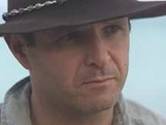After two days of team registration, skills, and gear testing, the first leg of the Eco-Challenge Sabah 2000 race course was finally revealed to the athletes. At the official race meeting in the Pacific Sutera Hotel, Executive Producer and Race Director Mark Burnett addressed the assembly of international teams. “The top racing teams in the world are here in Sabah,” he said, “This is indeed a World Championships.” The field of 76 teams from 26 nations is varied in skill level and experience, which may create a two or three-tiered race. There are a dozen or so teams which could legitimately contend for victory, and there are also many teams racing for the first time, nervous “newbies” excited just to be here. Burnett commented, “If you don’t finish you either had bad luck, bad strategy, just got off the sofa and showed up, or all of the above. It’s a beautiful course designed for you to finish – an incredible jungle and ocean environment.”

Burnett commented, “If you don’t finish you either had bad luck, bad strategy, just got off the sofa and showed up, or all of the above. It’s a beautiful course designed for you to finish – an incredible jungle and ocean environment.”
|  |
Using a multi-media presentation with a slide show and dramatic three-minute video shot just the day before the race, Burnett then provided a course overview. He touched generally on the jungle trekking and mountain bike legs, and described the first section of Leg One, which includes a ceremonial start in native Perahu outrigger canoes from the seaside village of Semporna on Sunday August 20. Onlooker’s mouths dropped open as images of Borneo burned the screen: crocodiles, monitor lizards, carnivorous plants that eat small rodents, and elephants. The race moves through the entire elephant habitat of Sabah, and quiet, attentive competitors have a good chance of seeing some of the most rare wildlife on earth, including possible glimpses of leopards, sunbears, pythons, cobras, even the world’s most rare rhino species. Local inhabitants believe in jungle spirits and after living in Borneo four months this year, Burnett now does too. “Move quietly in the jungle,” he said, “and have respect. It’s an amazing place to be glad you passed through safely.”
He added with a very serious tone, “The jungle trekking section is the real deal. Most is not on the trail. Plan your water consumption very, very carefully.”
Leg One, which commences with a ceremonial untimed start at 2pm Sunday from the busy little seaport of Semporna, starts with the native sailing vessel the Perahu canoe. Burnett cautioned that teams take great care of their vessels: “These boats are not indestructible by any means, so treat them well. The first paddle from Semporna to the island should give you a chance to get used to the boats.” The “ceremonial” start will take the perahu sailing vessels out past the beautiful stilted longhouses of Semporna to the island of Silawa, where teams will bed down for the night and then re-start in the early morning light of August 21.
Though many teams grumbled about the 12-hour bus ride from Kota Kinabalu to Semporna, most were relieved to be nearing the race start, and a number of teams seemed pleased about the untimed ceremonial start. Said Ike Wilson of Team Salomon/Eco-Internet, “That will be nice, because there won’t be pressure to head off too fast, and we can get a good feel for how these boats paddle.” At the end of the meeting, teams dispersed and calmly went over maps of the first section, organizing food and water rations for Leg One. The fastest teams will need three, maybe four days worth of food until they can restock at the first resupply station and slower teams will need to prepare for approximately six days as they will reach the re-supply a few days later.
Buses would unload the racers from the Magellan Sutera at 8p.m. for the long haul across Sabah.
The jungle and ocean Eco-Challenge Sabah 2000 is about to begin.
Go to Race Information // Course Map
Go to Race Information // Index
Go to Front Page